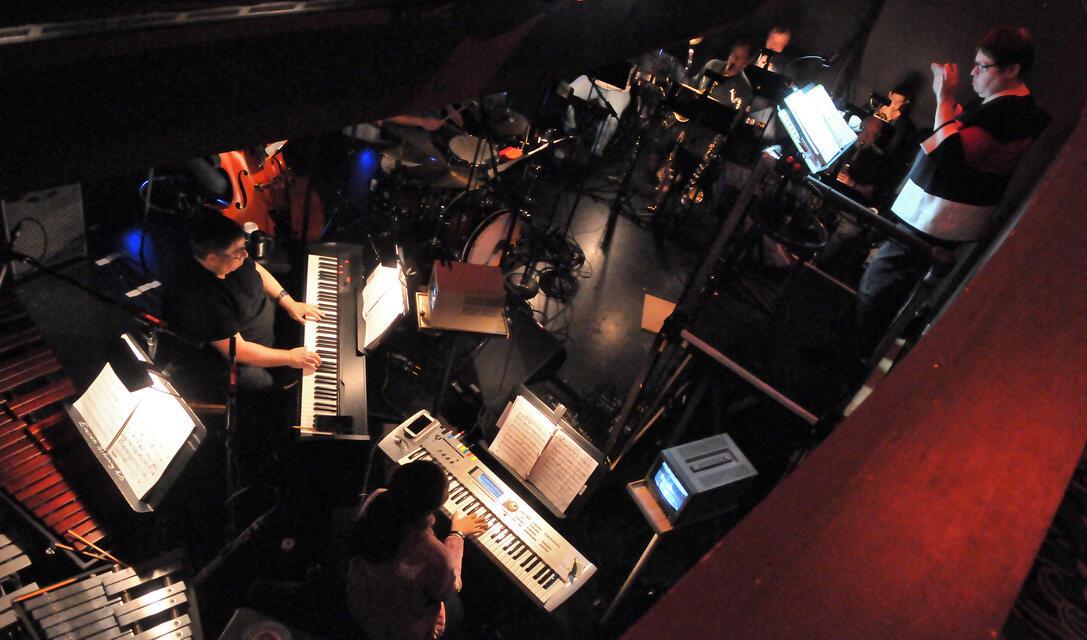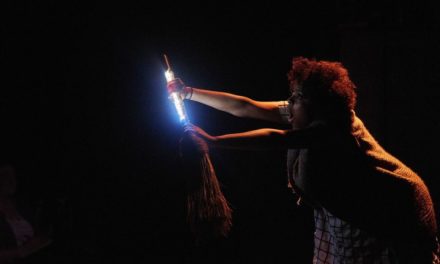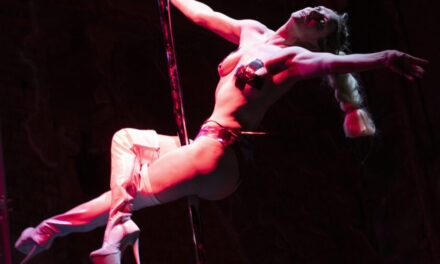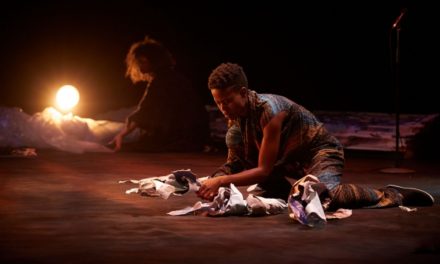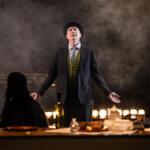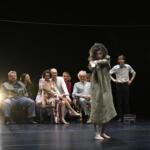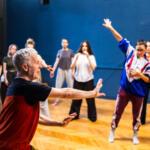When I was four years old, I asked my parents for piano lessons. We always had a piano in the house. There was a lot of big band music played on the stereo with the occasional Broadway cast recording thrown in. The story goes that I would sit down at the piano and noodle around. We had a family friend who was a piano teacher, so my parents asked her to assess my skills, after which she told my parents to provide the requested lessons.
Throughout my childhood, I took lessons filled with the usual method books and exercises. I think it was the John W. Schaum series, or maybe it was John Thompson’s Modern Course for the Piano. John somebody; I can’t remember. I do remember practicing after school, but never wanting to practice what I was supposed to. I wanted to play the pop songs of the day and sing along: Carole King, Carly Simon, James Taylor, and if I was feeling particularly pianistically adventurous, Billy Joel.
I quit lessons a number of times, but never quit playing. I spent all of my extra allowance and birthday money at Gribbon’s Music Store, the only such store in my hometown of Greenfield, Massachusetts, buying sheet music of all my favorite artists. As a teen, I fell in love with the band Chicago. I joined my high school marching band and symphonic band, not because I really wanted to but because I had to in order to play in the jazz band. It was all worth it when the jazz band played “Saturday in the Park” at a concert in my junior year and I got to play the iconic piano solo.
Growing up, I spent most of my after-school hours at the local Girls Club. It was there that I was first exposed to musical theatre. I loved the drama program, acting and singing, but it didn’t take long for everyone to realize that I could actually play the scores, so I played for my first show at the age of 11. I don’t remember what show it was, but I do remember having very mixed feelings about the honor because I wanted to be in the show.
A couple of years later, I was able to combine the two talents. My dad was the Dean of Faculty at Greenfield Community College and a big supporter of its theatre program. For some reason, I was allowed to hang out at rehearsals, and when they were doing Cabaret, the director asked my dad if I could play piano in the Kit Kat Club onstage band for their production. He wisely checked with my mom before asking me if I was interested, which I most definitely was. My parents agreed and, at the age of 13, I was put in fishnets and a skimpy dress and sent onstage to play “Willkommen.”
Fast forward a few years and I was faced with the decision of where to go to college. By that point I had decided to major in music, but I had no interest in a classical program. I had studied with a very cool teacher when I was in my teens who clearly saw my interest in pop music, theatre music, and jazz. I had been teaching myself about chords and she connected me with a grad student at UMass Amherst who opened up the world of jazz theory to me. Flat ninths and sharp elevenths! I was hooked. So I looked for a jazz program and chose the University of Arizona in Tucson. After I graduated with a degree in Jazz and Contemporary Media Music, I moved to New York and went directly to grad school at New York University’s Gallatin School of Individualized Study, where I was able to construct my own Master’s degree program with a focus in theatrical music direction.
NYU is a good place to network. I was asked to music direct in the inaugural cohort of the NYU Graduate Musical Theatre Writing Program, which was filled with future luminaries like Steven Lutvak (composer of A Gentleman’s Guide to Love and Murder) and Winnie Holzman (book writer of Wicked). Visiting professors included Stephen Sondheim and Hal Prince who were writing Merrily We Roll Along at the time. Even then, I knew I was experiencing something extraordinary.
Within a couple of years I started substituting in Broadway pits. Subbing involves learning a keyboard book for a show by practicing at home and then playing an actual performance without any rehearsal. I had nerves of steel back then and was a regularly working sub on many different shows. When Romance/Romance opened on Broadway, its music director, Kathy Sommer, asked me to sub for her. This gig involved not only playing the piano, but conducting at the same time. I had already done a lot of music directing from the piano, but this was Broadway and it was scary. Like I said, I had nerves of steel and I managed to do it and do it well. At the same time, I had been subbing on Keys 1 at Les Misérables (the original Broadway production) for a number of years, and the position was opening up full-time. I was hired as the regular Keys 1 player and the assistant conductor of the show, which involved conducting from the podium, not the piano. I had done that before too, but only in community theatre. I was exhilarated and petrified and I got myself a conducting teacher pronto. Long story short, I remained with Les Miz for the next ten years, logging thousands of performances as a player and hundreds as a conductor.
When I did the bulk of my conducting on Broadway, I was one of a handful of female conductors working on Broadway shows. Most of the opportunities I received (but not all) came via other women. I was aware that being a woman on the podium, and also being a left-handed conductor (much to the chagrin of my conducting teacher) could pose challenges to the success of my leadership. Fortunately, when people realized I could get the job done well, my gender (and left-handedness) were not issues. There were certainly times that being a woman, and particularly a mother, posed challenges for me off the podium. I had a music supervisor sit me down and say, “I know you have two children, but we want this show to be your top priority.” And when I was the regular keyboard player on another show, pregnant with my first child, I received a call from my sub to let me know that the conductor had contacted him, extremely concerned that I would give birth in the pit and wanting to know if my sub was available to replace me immediately. I will forever be grateful to that sub for alerting me to that situation.
So how did I come to do a research project about female and nonbinary conductors on Broadway? I have always been a lover of musical theatre history. My graduate thesis project at NYU was an original revue of music written by, for, and about women in the 1920s, ‘30s, and ‘40s. I was fascinated by powerful women working in male-dominated fields. My mother was one of the first female graduates of City College’s accounting program and an amazing role model of how to be a strong, impactful woman while also being a kind and loving person.
Maestra Music, an organization that provides support, visibility, and community to the women and nonbinary people who make the music in the musical theater industry, had published two timelines during the pandemic, Women and Nonbinary Composers on Broadway and Women and Nonbinary Composers Off-Broadway. I immediately wanted to see a timeline for Women and Nonbinary Conductors and Music Directors. After all, the name of the organization is the commonly used Italian term for a female conductor. I reached out to Georgia Stitt, Maestra’s founder, to suggest the idea and she responded with, “That’s a great idea. Do you want to do the research?”
Given my love of organization (I once had a side hustle as a professional organizer), collecting and organizing data held a certain appeal for me. I believe that data-driven research is often the catalyst for change and I hoped that this project would have an impact on my industry. I thought that such a timeline could inspire women and nonbinary musicians to pursue leadership roles in the field of musical theatre and identify possible mentors with whom to partner. So I agreed and, with a small grant from Emerson College, where I serve as Associate Professor and Head of Musical Theatre, I was able to hire a research assistant.
The research posed challenges because there is no central database of accurate information on Broadway conductors. The Internet Broadway Database (IBDB) keeps a record of all “title page” information about every Broadway production, but since it relies on official Playbills for its information, it typically excludes substitutes and often lacks accuracy on replacements, even though they are an integral part of every Broadway production.
Nevertheless, we used IBDB to gather the initial round of data and I relied on my professional network to fill in the gaps. Then, I personally reached out to everyone on the timeline that is still alive, a list of approximately 80 people, and connected with almost all of them. I had the honor of speaking with women who conducted on Broadway in the 1960s and 1970s, early pioneers and glass-ceiling breakers at the highest level of the musical theatre industry. I also spoke with many who came up through the ranks during the 1980s and 1990s, as well as the larger circle of women and nonbinary artists who are currently conducting on Broadway. The stories I heard were extremely compelling and I realized that I was uncovering a part of Broadway history that very few people know about.
Sande Campbell, one of the first women to ever conduct on Broadway, had passed away in 2024, but her son graciously shared her memorabilia with me and I was able to construct a chronology of her work. I spoke with Sue Anderson, also one of the first women to conduct on Broadway. She shared some of her stories with me as she was battling cancer. Sadly, we lost Sue in May of 2025. A number of women on the timeline credit Sue as their inspiration because she was the first female conductor they ever saw on Broadway.
Much to my surprise, the first woman credited as a music director on Broadway is Linda Bloodgood, who composed and music directed her own show, Jack’s Romance, in 1915. I also learned that Liza Redfield became the first full-time female principal conductor of a Broadway show, replacing Herbert Greene on The Music Man in 1960. She appeared on the popular television game show, “What’s My Line?”, where a celebrity panel asked a series of questions in an attempt to guess her job. The panelists came close, zeroing in on the fact that she worked on a Broadway show, but were unable to wrap their minds around her being the conductor. Finally, one of them asked if she was one of the strippers in Gypsy!
Kathy Sommer, who appears on the timeline, mentioned my work to Elizabeth Rose, a songwriter and member of the Board of Directors of the Society of Composers & Lyricists (SCL). Elizabeth reached out and invited me to present my research at an SCL symposium. I immediately accepted, and then Maestra Music offered to partner with the SCL, along with the Dramatists Guild.
It was at this point that I began to think about documenting my work. I received another research grant from Emerson to hire a student film crew from its esteemed graduate film program. On the afternoon of the symposium, we filmed a series of interviews, inviting the artists on the timeline to participate. I curated a list of topics and questions and structured the interviews as conversations, allowing the artists to talk to one another in groups of three. We hosted nine conductors on the afternoon of May 19, 2025, including Debra Barsha (Jersey Boys), Meg Zervoulis Bate (Cabaret at the Kit Kat Club), Haley Bennett (& Juliet), Vicki Carter (Eubie!), Lily Ling (Hell’s Kitchen), Cherie Rosen (The Lion King), Julia Schade (Six), Rona Siddiqui (A Strange Loop), and Kathy Sommer (Romance/Romance, Beauty and the Beast).
That same evening, we presented the symposium at the DiMenna Center for Classical Music in New York City. Attendees included members of each of the three collaborating organizations, in addition to a livestream available to the general public. Of the nine conductors interviewed, four appeared on the panel: Meg Zervoulis Bate, Vicki Carter, Lily Ling, and Kathy Sommer. They spoke passionately and eloquently about their lives and careers, and I served as moderator. (It should be noted here that, although none of the panelists identify as nonbinary, the timeline is inclusive of those who do.)
There are many different paths to becoming a theatrical music director (MD). For instance, Vicki was a classical piano major in college, but quickly discovered that she did not enjoy spending time in a practice room alone. When the theatre department needed a pianist, she made the leap to musical theatre. Lily shared that, as the daughter of immigrant parents who wanted her to be a doctor, she started college as a pre-med major and hated it. She told her parents she wanted to be a musician and they gave her one chance to audition for music school. Luckily she was accepted.
When asked about the skills needed to be an MD, the panelists spoke only briefly about musicianship, focusing instead on leadership qualities like organizational skills, people skills, and communication skills. Vicki half-jokingly remarked that a background in psychology is helpful because music direction involves so much collaboration. They all agreed that hiring the right musicians and creating an environment where the pit musicians are happy is crucial to the success of a show, especially if you are looking at the potential of a long run. Kathy pointed out that, as the central figure in the music department, the MD needs to be “a little bit of a magician; there are the arrangers, the orchestrators, the composer, and the director, and the MD needs to be the communication hub for all of that.” When speaking about pit musicians, she said, “You want all these people who are working for you to be excited to be there. They want to feel like they have something to contribute, and your job is to inspire them to do that everyday.”
It was very moving to discover the cross-generational connections present at the symposium. Lily revealed that Cherie Rosen, conductor of The Lion King, was the first woman she ever saw conduct on Broadway and seeing that representation inspired her to pursue her own career. Vicki talked about a young pianist whom she met while working at the Paper Mill Playhouse and how she has followed that woman’s career. She then revealed that Meg, seated next to her on the panel, was that young woman.
When discussing their experiences of being female in a male-dominated field, some felt that in order to be effective, they had to soften their approach. During the afternoon interviews, Rona Siddiqui shared a story about being in a recording session with one of her male counterparts. Delivering notes to a singer, she said, “Uh, that sounded really beautiful. I’m wondering if maybe when we get to this part, we phrase that just a little differently.” And her male colleague delivered his note, “You were flat in measure 27.” Rona realized, “I always feel like I have to do a little bit of softening and sugar coating and in that moment I saw myself doing a thing that I didn’t want to be doing.” Kathy nodded and added, “Our tendency as women is to please and make it sound nice and not too threatening when you’re asking for something, but in the end, I think we just need to speak with great clarity.” Surprisingly, Vicki, who conducted in the late 1970s, said, “I never felt like being a woman stood in the way of my getting work. Maybe it did, but I never felt like it. And also, no one ever called me ‘honey’.”
There are very few formal training programs for theatrical music directors, so mentorship and opportunities to learn on the job are key components of training the next generation of MDs. Vicki wishes that she had had more education about business, because “we are all small businesses; we’re the product, we’re the CEO, we’re everything.” Meg runs the Maestra mentorship program which pairs mentees with professional women and nonbinary mentors working in the industry. Kathy sang the praises of Meg’s program and talked about the importance of young people being well prepared for that first opportunity when it comes along: “None of us want anybody to fail at this job.”
The panelists agreed that women are typically judged more harshly than men in male-dominated fields, and preparation is absolutely critical to success. During the Q&A, an audience member brought up the topic of imposter syndrome, and Lily, who is Chinese-Canadian, shared, “When the doors open, it doesn’t matter how they open, it’s how you show up for those opportunities. I have, for my entire career, had my gender on one shoulder and my culture and race on the other, so ‘failure is not an option’.”
One of the best parts of the evening was hearing the panelists talk about times when something went wrong during a performance and how they managed to get through it without anybody in the audience knowing. Haley Bennett shared this story. The pit for & Juliet is in the basement of the theatre. One day, the theatrical haze got out of control and the fire alarm went off. She waited for the “show-stop” light to come on, but it never did. Apparently, the alarm couldn’t be heard elsewhere in the theatre, and the stage manager didn’t know it was going off in the basement. The musicians were trying very hard to stay together despite the fact that the alarm was loud and the pit was getting very smoky. The show continued, the alarm eventually stopped, and the haze cleared, but it remains a vivid memory for the entire band.
Sometimes music directors have to deal with musicians that don’t show up or that become ill during a show. The first time Meg conducted The Prom, there was a historic blizzard and two musicians did not make it to the theatre. She had to pull a woodwind player from a swing club a couple of blocks away and talk him through the show as it was happening. Even on Broadway, it is inevitable that something will go wrong, and the music director will have to figure out how to navigate the crisis.
The panelists spoke about their appreciation for the timeline as a historical reference that will inspire others for years to come. Kathy said, “Art matters. Art changes people. And history is a way of taking that art and letting us see where we’ve been, where we are now, and all that it took to get here. And that can help us inform what the future will be.” Lily closed with, “We all stand on the shoulders of the people before us and hopefully, with this timeline, we can be the shoulders for the next generation.”
I came away from the symposium reveling in the sense of community that permeated the day’s events. The artists felt nurtured by spending time together, renewing old friendships and making new ones. My inbox was filled with emails of support and gratitude for sharing this work with those who attended the symposium. One of those emails was from a young woman named Whitney, a music director and keyboard player who had just started subbing on her first Broadway show. She wrote, “I left your event feeling supported and inspired to get to the next phase of my journey.” Since one of my goals for this project was to inspire women and nonbinary musicians to pursue leadership roles in the field of musical theatre, that was particularly gratifying.
The women who spent time together that day are hopeful that, at some point in the not-too-distant future, it won’t be unique to see a woman on the Broadway podium. Until then, it is important to do everything we can to encourage the little girls and young women and nonbinary people in our lives to play for the school musical, or conduct at the local community theatre, and to trust their ability to be leaders.
The timeline can be found at https://maestramusic.org/resources/timelines/timeline-of-broadway-conductors-and-mds/
The full symposium is available at https://www.dropbox.com/scl/fi/c5dclu2x820pv4vyfd655/SCL_MaestrasConducting.mp4? rlkey=q2yrrrk6jxc023mozf7yl0uv8&e=3&st=ibodbrib&dl=0
This article appeared in The Score, Volume 40, Issue 4, and has been reposted with permission.
This post was written by the author in their personal capacity.The opinions expressed in this article are the author’s own and do not reflect the view of The Theatre Times, their staff or collaborators.

